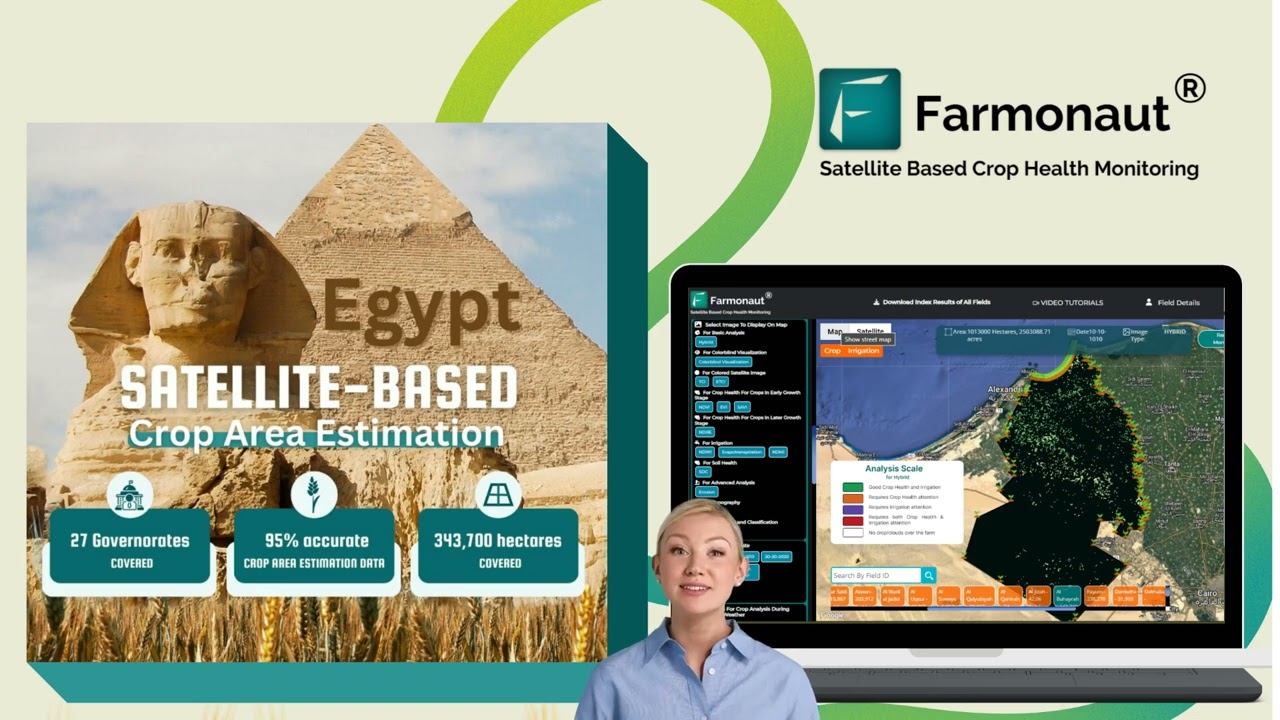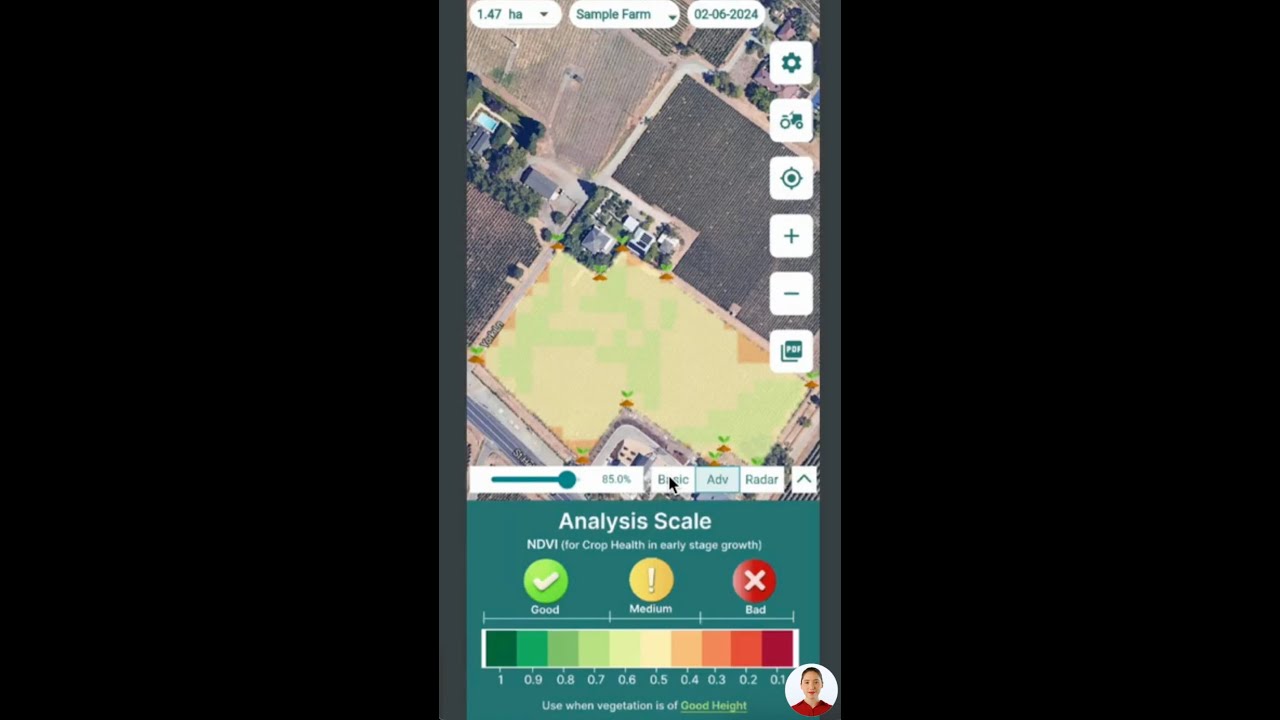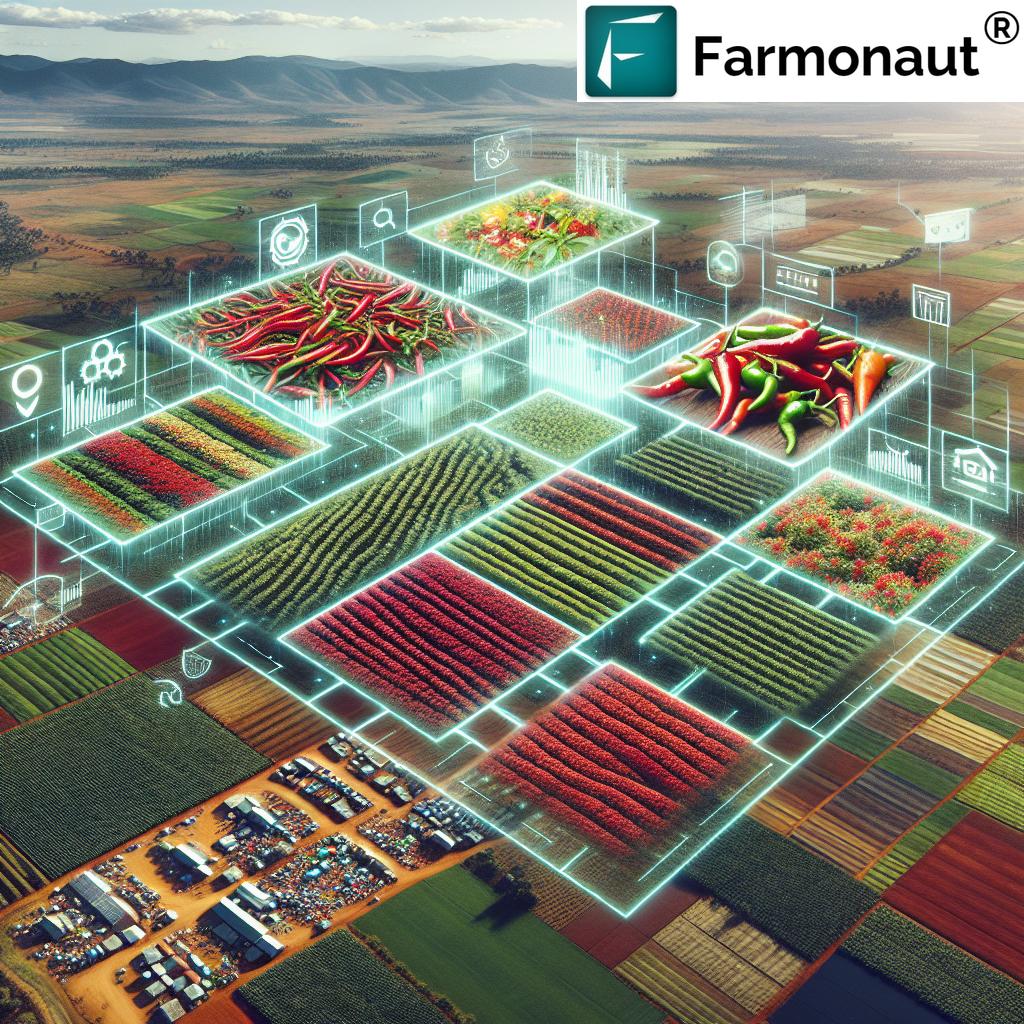Kenyan Avocado Exports to China Plummet: Analyzing Global Market Shifts and Future Prospects
“Kenyan avocado exports to China dropped by 80% in the first seven months of 2024, signaling major shifts in global markets.”
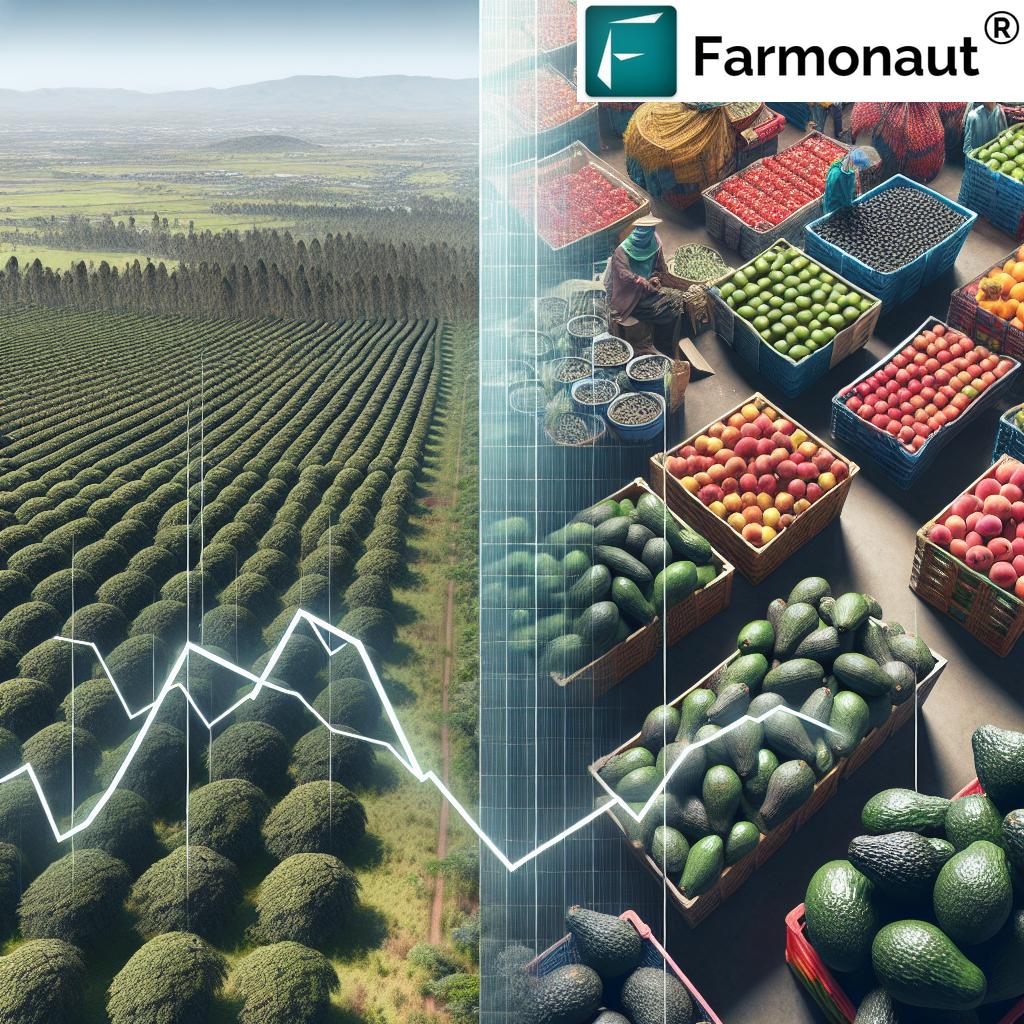
In the ever-evolving landscape of international trade in agriculture, we’ve witnessed a significant shift in the global avocado market. The recent plummet in Kenyan avocado exports to China has sent ripples through the industry, prompting a closer examination of market dynamics and future prospects. As we delve into this complex issue, we’ll explore the challenges faced by exporters, emerging markets for produce, and the role of innovative agritech solutions in addressing these hurdles.
The Dramatic Decline: Unpacking the Numbers
The statistics paint a stark picture of the current situation. In the first seven months of 2024, Kenyan avocado exports to China experienced a staggering 80% decrease. This sharp decline has not only impacted shipment volumes but has also significantly affected earnings for Kenyan producers and exporters. To put this into perspective, let’s examine the numbers more closely:
- Export volume: A dramatic reduction in metric tons shipped
- Earnings: A substantial decrease in revenue for the Kenyan avocado industry
- Market share: A significant shrinkage in Kenya’s presence in the Chinese market
This downturn raises critical questions about the stability of agricultural export markets and the need for diversification in trade partnerships.
Factors Contributing to the Decline
Several factors have contributed to this unexpected downturn in Kenyan avocado exports to China:
- Low consumption rates in Asia: Despite initial optimism, the avocado has not gained the expected traction among Chinese consumers.
- Competition from other producers: Countries like Peru and Mexico have increased their market share in China.
- Logistical challenges: The complexities of shipping perishable goods over long distances have posed significant hurdles.
- Changing consumer preferences: Shifts in dietary trends and economic factors have influenced purchasing decisions.
These challenges highlight the need for a more nuanced approach to international trade in agriculture, particularly when it comes to fresh produce like avocados.
Refocusing on European Markets
In response to the challenges in the Chinese market, Kenyan exporters have begun to refocus their efforts on the European market. This strategic pivot reflects the industry’s adaptability and resilience in the face of changing global dynamics. The European Union, with its established taste for avocados and robust import infrastructure, presents a more stable alternative for Kenyan producers.
Key advantages of the European market include:
- Established consumer base with a high avocado consumption rate
- Well-developed import and distribution networks
- Closer geographical proximity, reducing logistical challenges
- Potential for premium pricing on high-quality Kenyan avocados
This shift underscores the importance of market diversification and the need for exporters to remain agile in their approach to global trade.
Emerging Markets: New Frontiers for Kenyan Avocados
While Europe remains a crucial market, Kenyan exporters are also exploring new frontiers to diversify their export portfolio. Emerging markets in regions such as the Middle East and India present exciting opportunities for growth. These markets offer:
- Growing middle-class populations with increasing disposable income
- Rising health consciousness and interest in superfoods like avocados
- Potential for establishing early market dominance
- Opportunities for cultural integration of avocados into local cuisines
By tapping into these emerging markets, Kenyan avocado producers can mitigate risks associated with overreliance on any single market, ensuring a more stable and diverse export strategy.
“Despite initial optimism, low avocado consumption in Asia has led Kenyan exporters to refocus on the European market.”
Sustainable Farming Practices: A Key to Long-term Success
As Kenyan avocado exporters navigate these market shifts, the importance of sustainable farming practices cannot be overstated. Implementing eco-friendly cultivation methods not only ensures the long-term viability of avocado production but also meets the growing demand for sustainably sourced produce in international markets.
Key sustainable practices include:
- Water conservation techniques
- Integrated pest management
- Soil health preservation
- Biodiversity promotion on farms
By adopting these practices, Kenyan avocado producers can enhance their competitive edge in the global market while contributing to environmental conservation.
Crop Yield Optimization: Leveraging Technology for Increased Production
In the face of market challenges, optimizing crop yields becomes crucial for maintaining profitability. This is where innovative agritech solutions come into play. Farmonaut, a leading provider of precision agriculture technologies, offers a range of tools designed to help farmers maximize their avocado production.
Some key features of Farmonaut’s technology include:
- Satellite-based crop health monitoring
- AI-driven advisory systems for optimal farm management
- Real-time weather forecasting for informed decision-making
- Soil moisture analysis for efficient irrigation
By leveraging these advanced technologies, avocado farmers can make data-driven decisions to improve their yields and quality, ultimately enhancing their competitiveness in the global market.
The Role of Precision Agriculture in Addressing Export Challenges
As Kenyan avocado exporters grapple with the complexities of international trade, precision agriculture technologies offer a beacon of hope. These innovative solutions provide farmers and exporters with the tools they need to overcome many of the challenges they face in the global market.
Farmonaut’s precision agriculture technologies contribute to addressing export challenges in several ways:
- Quality Control: By monitoring crop health in real-time, farmers can ensure that their avocados meet the high standards required for export markets.
- Yield Prediction: Accurate forecasting of harvest volumes helps exporters plan their shipments more effectively, reducing waste and optimizing logistics.
- Resource Efficiency: Optimized use of water and fertilizers not only reduces costs but also aligns with the sustainability requirements of many international markets.
- Traceability: Blockchain-based solutions offer end-to-end traceability, a crucial factor in building trust with importers and consumers alike.
By integrating these technologies into their operations, Kenyan avocado producers can enhance their competitiveness and resilience in the face of market fluctuations.
Comparative Analysis of Kenyan Avocado Exports
To better understand the shifts in Kenyan avocado exports, let’s examine a comparative analysis of export volumes to major markets over the past five years:
| Year | Total Export Volume (tons) | China Export Volume (tons) | Europe Export Volume (tons) | Emerging Markets Export Volume (tons) | China Market Share (%) | Europe Market Share (%) | Emerging Markets Share (%) |
|---|---|---|---|---|---|---|---|
| 2020 | 70,000 | 5,000 | 55,000 | 10,000 | 7.1% | 78.6% | 14.3% |
| 2021 | 80,000 | 10,000 | 58,000 | 12,000 | 12.5% | 72.5% | 15% |
| 2022 | 85,000 | 15,000 | 57,000 | 13,000 | 17.6% | 67.1% | 15.3% |
| 2023 | 90,000 | 20,000 | 55,000 | 15,000 | 22.2% | 61.1% | 16.7% |
| 2024 (Jan-Jul) | 50,000 | 4,000 | 38,000 | 8,000 | 8% | 76% | 16% |
This table clearly illustrates the dramatic shift in export patterns, particularly the sharp decline in exports to China in 2024 and the concurrent increase in focus on the European market. It also highlights the gradual growth in exports to emerging markets, suggesting a potential avenue for future expansion.
The Impact of Changing Production Patterns in Peru and Mexico
The global avocado market is not solely influenced by Kenyan exports. Major producers like Peru and Mexico play a significant role in shaping market dynamics. Recent changes in production patterns in these countries have had ripple effects across the industry:
- Increased Production: Both Peru and Mexico have ramped up their avocado production in recent years, leading to increased competition in key markets.
- Market Diversification: These countries have also been actively seeking new markets, including China, which has impacted Kenya’s market share.
- Seasonal Advantages: Peru and Mexico’s production seasons sometimes overlap with Kenya’s, creating periods of oversupply in certain markets.
Understanding these global production trends is crucial for Kenyan exporters as they strategize for the future and seek to carve out their niche in the international avocado trade.
Explore Farmonaut’s API for advanced agricultural insights
Long-term Prospects for Expanding into New Markets
While the current focus is on recalibrating exports towards Europe and exploring emerging markets, it’s essential to consider the long-term prospects for Kenyan avocados. Several factors suggest potential for growth and expansion:
- Rising Global Demand: The popularity of avocados continues to grow worldwide, driven by health-conscious consumers and culinary trends.
- Untapped Markets: Many regions, particularly in Asia and the Middle East, still have low per capita avocado consumption, presenting opportunities for market development.
- Value-Added Products: Expanding into processed avocado products (e.g., guacamole, avocado oil) could open new market segments.
- Sustainable Branding: Emphasizing Kenya’s commitment to sustainable farming practices could create a unique selling proposition in environmentally conscious markets.
By taking a strategic, long-term view and leveraging these opportunities, the Kenyan avocado industry can work towards a more diversified and resilient export market.
The Role of Technology in Market Analysis and Decision-Making
In navigating the complex landscape of international avocado trade, access to accurate and timely data is crucial. This is where Farmonaut’s advanced agricultural technologies come into play. By providing real-time insights and predictive analytics, these tools empower exporters to make informed decisions about market entry, production volumes, and logistics.
Key technological applications in market analysis include:
- Satellite Imagery Analysis: Monitoring global avocado production areas to predict supply fluctuations
- AI-Driven Market Forecasting: Utilizing machine learning algorithms to predict market trends and demand patterns
- Blockchain for Supply Chain Transparency: Enhancing traceability and building trust with international buyers
- Big Data Analytics: Processing vast amounts of global trade data to identify emerging opportunities and potential challenges
By leveraging these technological solutions, Kenyan avocado exporters can stay ahead of market shifts and make strategic decisions to optimize their global presence.
Access Farmonaut’s API Developer Docs for integration guidance
Addressing Agricultural Export Challenges with Agritech Solutions
The challenges faced by Kenyan avocado exporters are not unique to this industry. Many agricultural exporters grapple with similar issues, from quality control to logistical hurdles. Agritech solutions, such as those offered by Farmonaut, provide innovative ways to address these common challenges:
- Quality Assurance: Using satellite imagery and AI to monitor crop health and predict optimal harvest times
- Yield Optimization: Implementing precision agriculture techniques to maximize production efficiency
- Logistics Planning: Utilizing data analytics to optimize supply chain management and reduce waste
- Market Intelligence: Providing real-time insights into global market conditions and consumer trends
By adopting these agritech solutions, exporters can enhance their competitiveness in the global market and build more resilient business models.
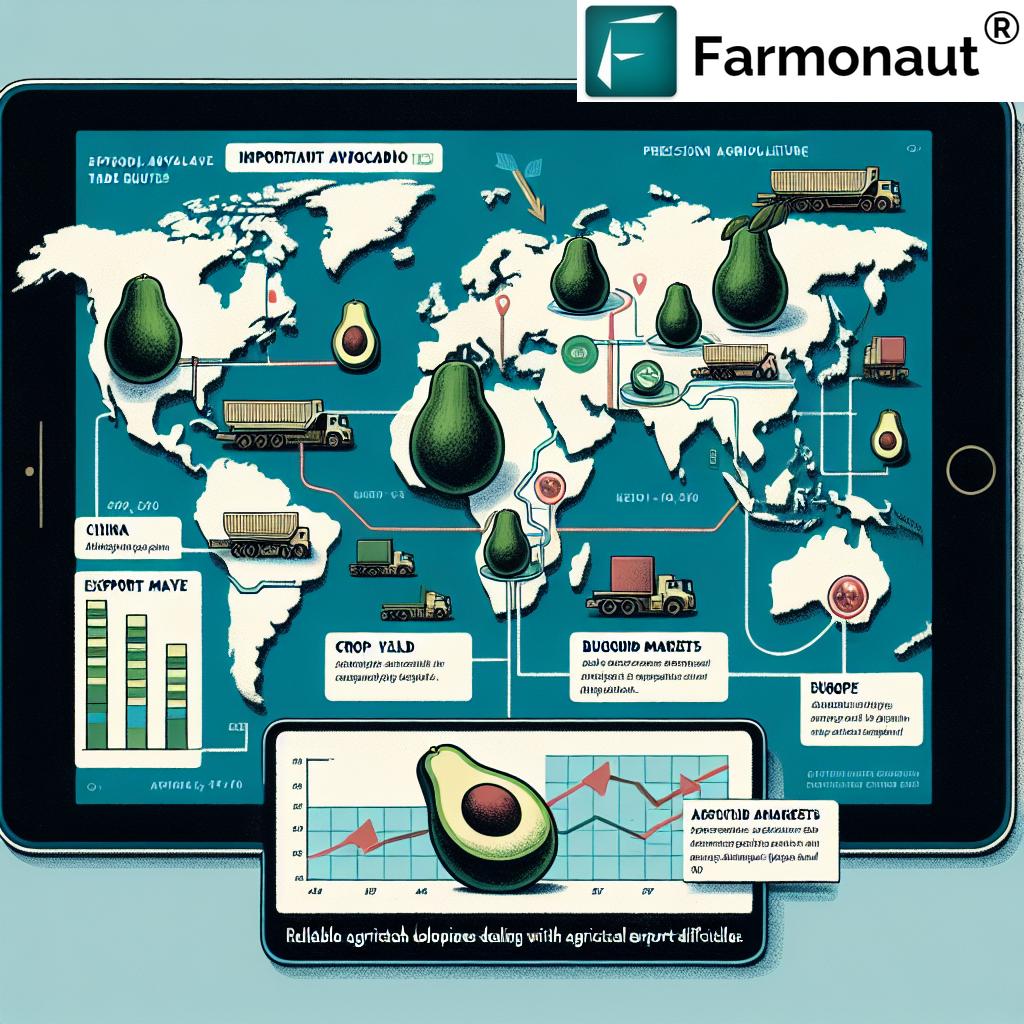
The Future of Kenyan Avocado Exports: Adapting to a Changing Landscape
As we look to the future of Kenyan avocado exports, it’s clear that adaptability and innovation will be key to success. The industry must navigate a complex interplay of factors, including:
- Evolving consumer preferences in different global markets
- The impact of climate change on avocado production
- Increasing competition from other avocado-producing nations
- The role of trade agreements and international regulations
By embracing technological solutions, focusing on sustainability, and remaining agile in their approach to market diversification, Kenyan avocado exporters can turn these challenges into opportunities for growth and innovation.
Conclusion: Navigating the Path Forward
The recent plummet in Kenyan avocado exports to China serves as a stark reminder of the volatility inherent in international agricultural trade. However, it also presents an opportunity for the industry to reassess its strategies and explore new avenues for growth. By leveraging advanced agritech solutions, embracing sustainable farming practices, and diversifying into new markets, Kenyan avocado producers and exporters can build a more resilient and prosperous future.
As we’ve seen, tools like those offered by Farmonaut play a crucial role in this transformation, providing the data-driven insights necessary to navigate complex global markets. The journey ahead may be challenging, but with innovation, adaptability, and a commitment to quality, the Kenyan avocado industry is well-positioned to thrive in the ever-evolving landscape of international trade.
Farmonaut Subscriptions
Frequently Asked Questions
Q1: What caused the significant drop in Kenyan avocado exports to China?
A1: The dramatic 80% decrease in Kenyan avocado exports to China in the first seven months of 2024 was primarily due to lower-than-expected consumption rates in Asia, increased competition from other producers like Peru and Mexico, and logistical challenges in shipping perishable goods over long distances.
Q2: How are Kenyan avocado exporters responding to this market shift?
A2: Kenyan exporters are refocusing their efforts on the European market, which offers a more established consumer base and closer geographical proximity. They are also exploring emerging markets in regions such as the Middle East and India to diversify their export portfolio.
Q3: What role does technology play in addressing these export challenges?
A3: Advanced agritech solutions, such as those offered by Farmonaut, play a crucial role in optimizing crop yields, ensuring quality control, and providing real-time market insights. These technologies help farmers and exporters make data-driven decisions to enhance their competitiveness in the global market.
Q4: How can sustainable farming practices benefit Kenyan avocado producers?
A4: Implementing sustainable farming practices not only ensures the long-term viability of avocado production but also meets the growing demand for sustainably sourced produce in international markets. This can provide Kenyan producers with a competitive edge and access to premium markets.
Q5: What are the long-term prospects for Kenyan avocado exports?
A5: While current challenges exist, the long-term prospects for Kenyan avocado exports remain positive. Factors such as rising global demand for avocados, potential for market development in regions with low per capita consumption, and opportunities in value-added products suggest potential for growth and expansion in the future.


